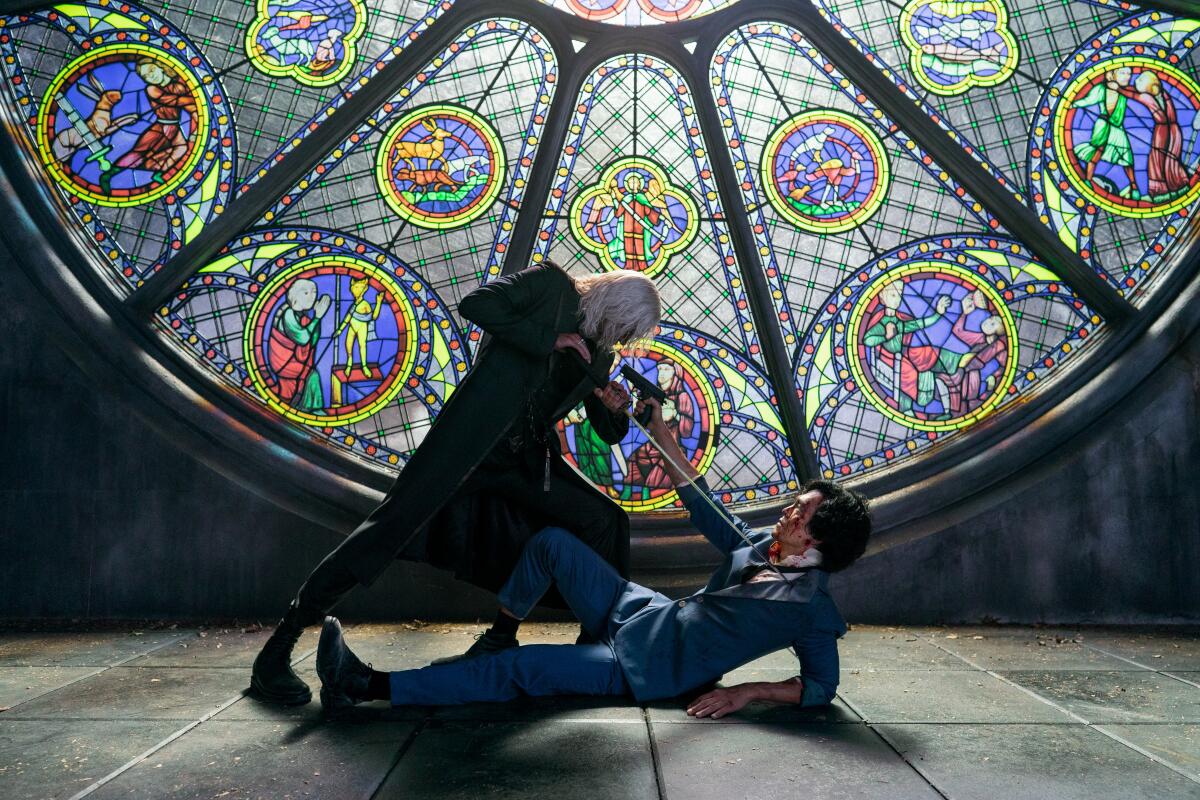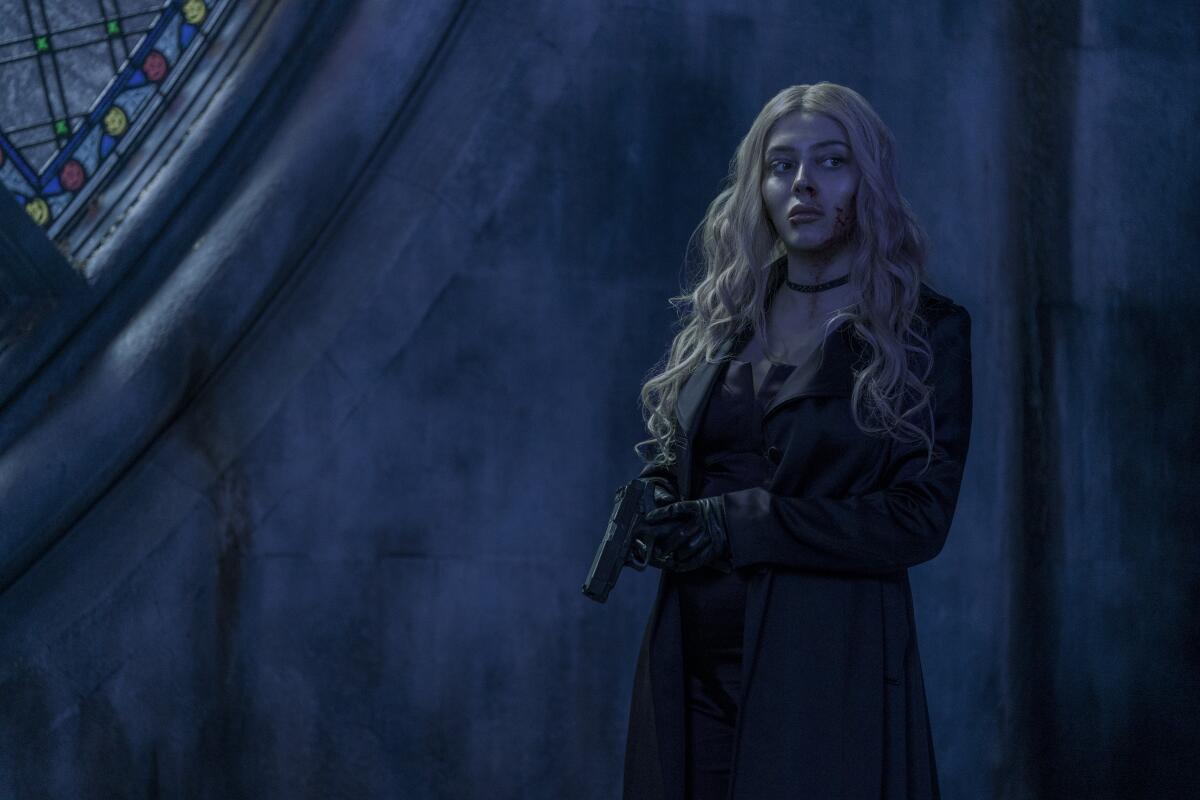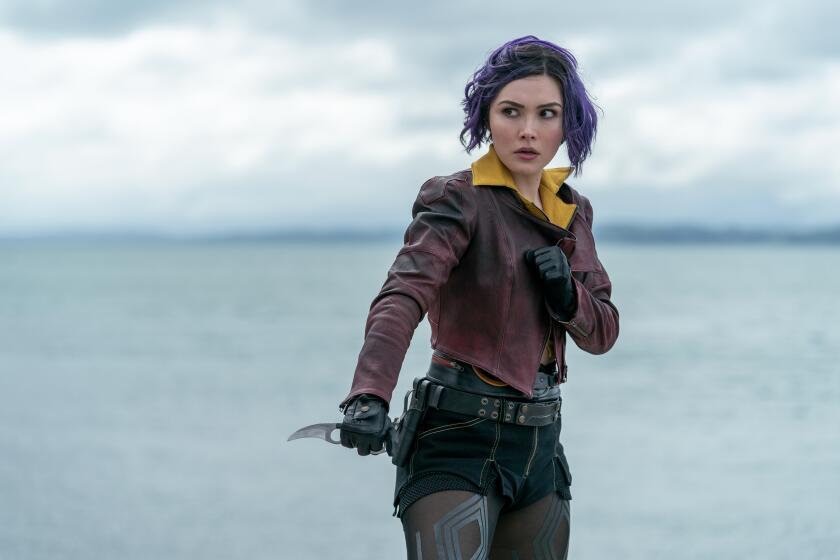The showrunner of Netflix’s ‘Cowboy Bebop’ explains that shocking finale twist

- Share via
This story discusses details from the Season 1 finale of Netflix’s “Cowboy Bebop.” If you have yet to watch the season, consider this feature about how the live-action adaptation is different from the anime.
Netflix’s live-action “Cowboy Bebop” series is akin to a new arrangement of the opus that is the beloved original anime series.
Starring John Cho, Mustafa Shakir and Daniella Pineda as the cowboys of the spaceship Bebop, the new adaptation layers familiar characters, moments, visuals, sounds and other references from the anime with its own unique narrative that — while spiritually faithful to the anime — diverges at times from the story told in the original show.
This is especially apparent in the season finale, which culminates with Julia’s (Elena Satine) transformation into a full-on villain. This arc, unique to the live-action series, is one of the biggest changes it makes from the anime.
“The more we talked about [Julia] in the writers room, the more it became clear that we had this amazing opportunity to birth a villain,” said “Cowboy Bebop” showrunner and executive producer André Nemec. “To see this woman — who has been put into this environment and, through her desire to escape the environment, [is] inculcated into its horror, into its violence — realize that [she can] take the reins now.”
Here is a breakdown of some of the key elements from the “Cowboy Bebop” finale that sets it apart from the story told in the original show.
The new live-action adaptation of the 1998 Japanese anime updates its female characters. And it’s better for it.
How different is Julia in the anime?
In the anime, Julia is not much more than a figure from Spike’s past who haunts his memories — until she briefly appears in the final episodes. Besides the fact that she is somehow tied to Spike and Vicious’ rivalry, much of her story is a mystery. And although Julia and Spike’s reunion in the anime is much more amicable, with the Julia choosing to follow Spike so they can be together, she’s killed shortly after.
Nemec sees the Julia of the anime as “more of an idea.”
“She is more of a dramatic device, fairly, for the storytelling of the anime,” said Nemec. But the goal for the live-action series was to give her more agency while staying true to the spirit of the original.
Julia is much more present and her backstory more developed in the new “Cowboy Bebop,” which delves into the trio’s history in its penultimate episode to help explain the root of Spike (Cho) and Vicious’ (Alex Hassell) intense animosity. It’s this history that drives Julia’s actions leading up to and throughout the finale.

What’s the significance of the cathedral?
The live-action finale is inspired by the anime’s fifth episode, “Ballad of Fallen Angels.” In that episode, Spike is lured to a cathedral by Vicious who, after killing someone important to Spike, has also captured Faye. Their showdown involves a memorable fight sequence that leads to Vicious throwing Spike through the glass of a large window.
For Nemec, it was important that the live-action version of Faye (Pineda) be more than just a means to get to this fight.
“One of the things that I knew very early on was that I wanted Faye to not show up to the cathedral as a victim,” said Nemec. “She’s had to be the hero of the day, which she is.”
We surveyed The Times TV team to come up with a list of the 75 best TV shows you can watch on Netflix. As in, tonight.
Why did Julia shoot Spike?
“I knew that I wanted Julia to show up to the cathedral,” said Nemec. “I knew that I wanted Julia to shoot Vicious.”
But if Julia’s reason for shooting Vicious was clear from the get-go, the reason for her shooting Spike came later, as Nemec and the writers room considered Julia and Spike’s reunion. Nemec realized it was important for Julia to ask Spike why he had never gone back for her: From her perspective, he just abandoned her to a life with Vicious.
“She shoots him out the window and to me it feels very justified in that moment,” said Nemec. “She doesn’t need him anymore. And I think it speaks volumes to Spike’s character, to the romantic ideas that float through his head and to the dreams that he has from the very beginning, that he still longs for something that he hasn’t allowed to evolve. His thoughts are frozen in time and hers are absolutely not.”
What’s with the kid who finds Spike at the very end?
That character is Radical Edward (Eden Perkins), a brilliant young hacker who was briefly mentioned earlier in the series. In the anime, Ed is the fourth crewmember of the Bebop and joins the team in the ninth episode. Her full name, at least in the anime, is Edward Wong Hau Pepelu Tivruski IV.
Ed’s introduction in the anime disrupts the Bebop crew’s established dynamic. But she also helps strengthen their bond, and her skills become invaluable to the team.
“It felt important to me to really be able to mine the characters of Spike and Jet and Faye, to really cement the crew of the Bebop, and get to know who these people are before dropping the Ed atom bomb on them,” said Nemec. Because she “will only spin more chaos into the group.”
Nemec said there wasn’t enough time to properly introduce Radical Edward during “Cowboy Bebop’s” first season.
“There’s a lot to mine out of Radical Ed and who she is, what she is, where she comes from [and] why she does what she does,” said Nemec. “So that meant saving Radical Ed for a second season, fingers crossed, where we really get to tell Ed’s story.”
So why was the Radical Edward cameo included at all? Because Nemec thought it was important to cut the heaviness of the finale — to “leave everybody with a little bit of a smile on their face, versus the tragedy.
“That final moment with Ed was a reminder that things will go on,” said Nemec. “There’s this other crazy energy that’s about to turn things upside down.”
More to Read
The complete guide to home viewing
Get Screen Gab for everything about the TV shows and streaming movies everyone’s talking about.
You may occasionally receive promotional content from the Los Angeles Times.






